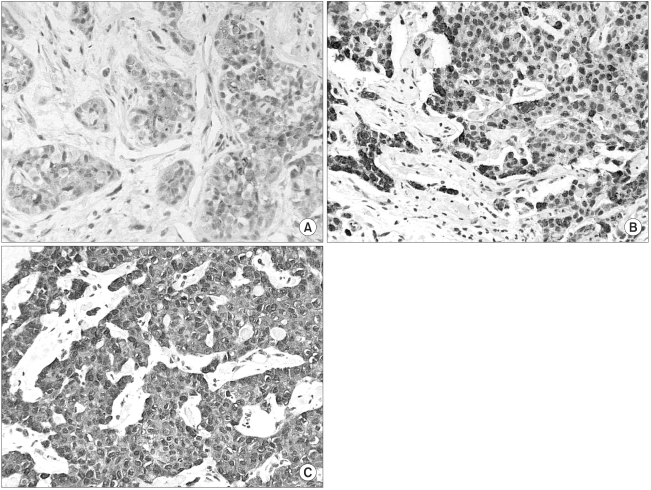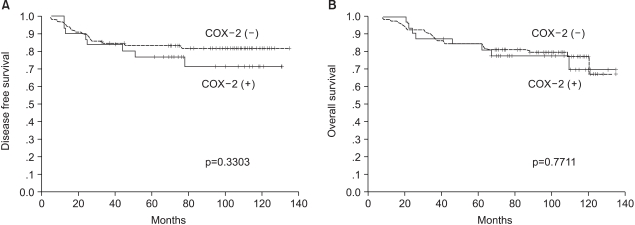Cancer Res Treat.
2005 Jun;37(3):165-170.
Expression of Cyclooxygenase-2 in Human Breast Cancer: Relationship with HER-2/neu and other Clinicopathological Prognostic Factors
- Affiliations
-
- 1Ewha Medical Research Center, Departments of Internal Medicine, Ewha Womans University College Medicine, Seoul, Korea. snlee@ewha.ac.kr
- 2Daejin Medical Center, Pundang Jesaeng General Hospital, Ewha Womans University College Medicine, Seoul, Korea.
- 3Ewha Womans University College of Medicine, Ewha Womans University College Medicine, Seoul, Korea.
- 4Seoul National University College of Medicine, Ewha Womans University College Medicine, Seoul, Korea.
- 5Dongguk University College of Medicine, Ewha Womans University College Medicine, Seoul, Korea.
- 6Department of Pathology, Ewha Womans University College Medicine, Seoul, Korea.
Abstract
- PURPOSE
Previous epidemiologic studies have demonstrated that nonsteroidal anti-inflammatory drugs can reduce the risk of breast cancer, and this possibly happens via cyclooxygenase (COX) inhibition. Moreover, growth factor-inducible COX-2, which is overexpressed in neoplastic tissue, is an attractive therapeutic target. Thus, we evaluated the expression of COX-2 in breast cancer tissues, and we assessed the association between COX-2 expression and HER-2/neu expression and also with several clinicopathological features. MATERIALS AND METHODS: We analyzed the surgical specimens from 112 women with breast cancer who had undergone lumpectomy or mastectomy. The expressions of COX-2, HER-2/neu, MMP-2 and TIMP-2 were determined immunohistochemically. The correlations between COX-2 expression and several variables, including clinicopathological factors, HER-2/neu expression, MMP-2 expression and TIMP-2 expression were analyzed. Survival analysis was also performed with respect to COX-2 overexpression. RESULTS: The overexpression of COX-2 protein was observed in 28.6% of the breast cancer tissues. Tumors with lymph node metastasis more frequently showed COX-2 overexpression than did those tumors without metastasis (p=0.039), and the increased COX-2 expression correlated positively with HER-2/neu overexpression (p=0.000). No significant differences were found for the MMP-2 or TIMP-2 expression rates in the COX-2 positive and negative groups. The survival analysis revealed no significant differences according to the COX-2 expression. CONCLUSION: This study results suggest that increased COX-2 expression is related with the progression of breast cancer, e.g., with lymph node invasion. COX-2 overexpression found to be related with HER-2/neu overexpression, but not with MMP-2 or TIMP-2 expression. These results support the potential use of selective agents that inhibit COX-2 or HER-2/neu for the management of breast cancer.
Keyword
MeSH Terms
-
Breast Neoplasms*
Breast*
Cyclooxygenase 2*
Epidemiologic Studies
Female
Humans*
Lymph Nodes
Mastectomy
Mastectomy, Segmental
Neoplasm Metastasis
Prostaglandin-Endoperoxide Synthases
Tissue Inhibitor of Metalloproteinase-2
Cyclooxygenase 2
Prostaglandin-Endoperoxide Synthases
Tissue Inhibitor of Metalloproteinase-2
Figure
Reference
-
1. Thun MJ, Namboodiri MM, Heath CW Jr. Aspirin use and reduced risk of fatal colon cancer. N Engl J Med. 1991; 325:1593–1596. PMID: 1669840.
Article2. Khuder SA, Mutgi AB. Breast cancer and NSAID use: a meta-analysis. Br J Cancer. 2001; 84:1188–1192. PMID: 11336469.
Article3. Dempke W, Rie C, Grothey A, Schmoll HJ. Cyclooxygenase-2: a novel target for cancer chemotherapy? J Cancer Res Clin Oncol. 2001; 127:411–417. PMID: 11469677.
Article4. Soslow RA, Dannenberg AJ, Rush D, Woerner BM, Khan KN, Masferrer J, et al. COX-2 is expressed in human pulmonary, colonic, and mammary tumors. Cancer. 2000; 89:2637–2645. PMID: 11135226.
Article5. Kang HJ, Gong G, Jang SJ, Jung PJ, Park CK. Expression of cyclooxygenase-2 in human breast carcinoma: relevance to tumor angiogenesis and expression of estrogen receptor. Cancer Res Treat. 2001; 33:286–295.
Article6. Ristimäki A, Sivula A, Lundin J, Lundin M, Salminen T, Haglund C, et al. Prognostic significance of elevated cyclooxygenase-2 expression in breast cancer. Cancer Res. 2002; 62:632–635. PMID: 11830510.7. Half E, Tang XM, Gwyn K, Sahin A, Wathen K, Sinicrope FA. Cyclooxygenase-2 expression in human breast cancers and adjacent ductal carcinoma in situ. Cancer Res. 2002; 62:1676–1681. PMID: 11912139.8. Costa C, Soares R, Reis-Filho JS, Leitao D, Amendoeira I, Schmitt FC. Cyclo-oxygenase 2 expression is associated with angiogenesis and lymph node metastasis in human breast cancer. J Clin Pathol. 2002; 55:429–434. PMID: 12037025.
Article9. Ahn JH, Kim SB, Ahn SH, Gong GY, Ahn MJ, Kang YK, et al. Clinical value of cyclooxygenase-2 expression in human breast carcinoma. Cancer Res Treat. 2004; 36:192–198.
Article10. Liu CH, Chang SH, Narko K, Trifan OC, Wu MT, Smith E, et al. Overexpression of cyclooxygenase-2 is sufficient to induce tumorigenesis in transgenic mice. J Biol Chem. 2001; 276:18563–18569. PMID: 11278747.
Article11. Kundu N, Yang Q, Dorsey R, Fulton AM. Increased cyclooxygenase-2 (COX-2) expression and activity in a murine model of metastatic breast cancer. Int J Cancer. 2001; 93:681–686. PMID: 11477578.
Article12. Harris RE, Alshafie GA, Abou-Issa H, Seibert K. Chemoprevention of breast cancer in rats by celecoxib, a cyclooxygenase 2 inhibitor. Cancer Res. 2000; 60:2101–2103. PMID: 10786667.13. Kundu N, Fulton AM. Selective cyclooxygenase (COX)-1 or COX-2 inhibitors control metastatic disease in a murine model of breast cancer. Cancer Res. 2002; 62:2343–2346. PMID: 11956094.14. Watson AJ. Chemopreventive effects of NSAIDs against colorectal cancer: regulation of apoptosis and mitosis by COX-1 and COX-2. Histol Histopathol. 1998; 13:591–597. PMID: 9589912.15. Masferrer JL, Leahy KM, Koki AT, Zweifel BS, Settle SL, Woerner BM, et al. Antiangiogenic and antitumor activities of cyclooxygenase-2 inhibitors. Cancer Res. 2000; 60:1306–1311. PMID: 10728691.16. Tsujii M, Kawano S, DuBois RN. Cyclooxygenase-2 expression in human colon cancer cells increases metastatic potential. Proc Natl Acad Sci USA. 1997; 94:3336–3340. PMID: 9096394.
Article17. Takahashi Y, Kawahara F, Noguchi M, Miwa K, Sato H, Seiki M, et al. Activation of matrix metalloproteinase-2 in human breast cancer cells overexpressing cyclooxygenase-1 or -2. FEBS Lett. 1999; 460:145–148. PMID: 10571077.
Article18. Slamon DJ, Clark GM, Wong SG, Levin WJ, Ullrich A, McGuire WL. Human breast cancer: correlation of relapse and survival with amplification of the HER-2/neu oncogene. Science. 1987; 235:177–182. PMID: 3798106.19. Vadlamudi R, Mandal M, Adam L, Steinbach G, Mendelson J, Kumar R. Regulation of cyclooxygenase-2 pathway by HER2 receptor. Oncogene. 1999; 18:305–314. PMID: 9927187.
Article20. Subbaramaiah K, Norton L, Gerald W, Dannenberg AJ. Cyclooxygenase-2 is overexpressed in HER-2/neu-positive breast cancer: evidence for involvement of AP-1 and PEA3. J Biol Chem. 2002; 277:18649–18657. PMID: 11901151.21. Howe LR, Subbaramaiah K, Patel J, Masferrer JL, Deora A, Hudis C, et al. Celecoxib, a selective cyclooxygenase 2 inhibitor, protects against human epidermal growth factor receptor 2 (HER-2)/neu-induced breast cancer. Cancer Res. 2002; 62:5405–5407. PMID: 12359744.22. American Joint Committee on Cancer. AJCC cancer staging manual. 1997. 5th ed. Philadelphia: Lippincott-Raven;p. 171–180.23. Elston CW, Ellis IO. Elston CW, Ellis IO, editors. Assessment of histological grade. The breast: Systemic pathology. 1998. Vol 13:3rd ed. Edinburgh: Churchill Livingstone;p. 368–376.
- Full Text Links
- Actions
-
Cited
- CITED
-
- Close
- Share
- Similar articles
-
- Correlation of the Immunohistochemical Coexpression of p53 and HER-2/neu and the Prognosis of Breast Cancer
- Value of Phospholipase C gamma-1, Epidermal Growth Factor Receptor, and Her-2/neu in Human Breast Cancer
- Prognostic Implications of the Expression of CXCL16 in Breast Carcinoma
- An Immunohistochemical Study for the neu and ras Oncoprotein and Epidermal Growth Factor Receptor in the Breast Carcinoma
- A Clinical Analysis of PTEN Expressions in Breast Cancers



